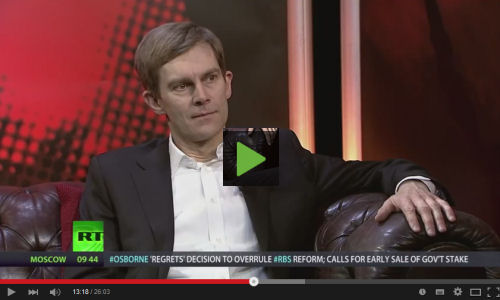Video & transcript: Media hysteria puts world at risk of war: Seumus Milne, Assoc Editor, Guardian newspaper, UK
 "Bombers in the channel and warships off Britain’s coast… If you believe the British media and some government ministers, it’s only a matter of time before the Red Army complete with snow on their boots turns up on a high street near you. How hot is the new Cold War going to get? Helping us to answer the question is the Guardian's associate editor Seumas Milne." - George Galloway, British MP interviews Seumas Milne.
"Bombers in the channel and warships off Britain’s coast… If you believe the British media and some government ministers, it’s only a matter of time before the Red Army complete with snow on their boots turns up on a high street near you. How hot is the new Cold War going to get? Helping us to answer the question is the Guardian's associate editor Seumas Milne." - George Galloway, British MP interviews Seumas Milne.
Seumus Milne: I think in last few weeks and months it has reached fever pitch. You've got the level of media coverage of this crisis in Ukraine now 'Russia's role' in it and Russia's role in Europe and Putin in particular has become hysterical and completely unrelated to reality. And I think it is quite dangerous. I think they're whipping up a kind of war-fever and preparing people for a level of intervention that, you know, British people, people in this part of the world in Western Europe are actually not committed to at all. Nor in the United States. They're trying to lay the ground for a level of action in relation to Russia and the Ukraine that I think is (a) unjustified, and (b) not at all supported by public opinion. But these things have a momentum of their own. And you know, in the last few weeks, we've seen decisions to send American and British troops - in relatively small numbers - we're talking hundreds - but still troops - to Ukraine, which is not a member of NATO, to a zone where there is conflict, in which there's a civil war going on, which Russia is supporting one side in that war and the United States, Britain, France and the other NATO powers are supporting the other side. A government that came to power in an illegal overthrow of an elected government.
And this is a dangerous situation which can spin out of control. So I think it's necessary for us in this part of the world to be actually much tougher with our own governments and our own military and our own media about the stories they're telling about the situation because it's something that can lead to disaster.
I don't think it's the intention of either Russia or the Western powers for this to [turn into a hot war] I don't think the West intends to fight in Ukraine, although it's clearly drawn the line in the NATO states that it's set up in the former Soviet Union - particularly the Baltic States. But, as we're talking about, these things have their own logic and they can lead to their own forms of escalation.
If for example, as there is incredibly strong pressure in the US from both main parties - Republicans and Democrats - to arm the Ukrainian government, which has been resisted up to this point, by France and Germany in particular. If that takes place and they send heavy weapons to Ukrainian forces - by the way, which include fascist militias fighting on the front line in Eastern Ukraine, with names like the Azov Battalion, where they have swastika-like symbols on their arms and belief in racial superiority and white supremacy. These are some of the forces that we're talking about arming and supporting, that the West is supporting at the moment. If that happens and the Russians then increase the level of supplies with heavy weapons to the rebel camp in Eastern Ukraine - You know, the potential for that conflict spinning out of control is very serious!
And, in fact, we've had British generals, you know, like the former British representative at NATO who has been speaking out last week, saying just this: that the potential for what he called total war is there and his argument is, you know, that the British Government and NATO must take this seriously, that military spending must be increased. And a lot of people are using this conflict as a way to try and protect the army and the armed forces from cuts and to, you know, spend more on weapons.
But if people like that themselves are saying it, I think we should take it seriously and wind down the conflict. And raise the pressure, in this country and other parts of the world to wind down this conflict, to de-escalate the conflict. We've got to - At the moment there's a cease-fire in Eastern Ukraine which is more or less holding and some of the heavy weapons have been pulled back from the front line as a result of this so-called Minsk Agreement that was signed last month. But the sending of troops by Britain and America to Ukraine to Kiev actually explicitly breaks that agreement that was signed - the ceasefire agreement. Article 10 in that ceasefire agreement - the Minsk Agreement - stipulates withdrawal of all foreign forces from Ukraine and that has been breached by our own government, by the United States government, directly. But, you know, that agreement is likely to break down again because it doesn't deal with the underlying causes and we're likely to see a new escalation in the months to come.
So we need to be promoting - I think quite seriously - and pressing for an alternative - and an end to this ludicrous anti-Russian propaganda, which is blinding people to the reality of what's going on and making a genuine debate and dialogue about what's taking place impossible because anything that contradicts the NATO line, the western line, which overwhelmingly dominates the western media, is immediately dismissed as Kremlin propaganda. Whatever the truth of it.


Recent comments